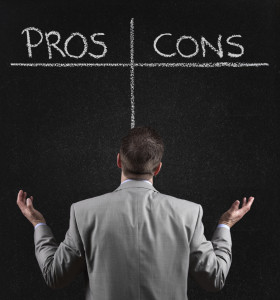Logical, Loyal, or Just Plain Dumb?
Next month I will get my renewal notice in the mail for my Dolphins season tickets. My wife and I have had the tickets for almost 30 years, but very year for the past half-dozen or so I’ve struggled with the decision. It should be a no-brainer: I’m unhappy with the performance of the team, don’t see much evidence that it will change soon, and quite frankly don’t enjoy attending the games nearly as much as I used to.
But so far I keep forking out the money, and I blame a mental bias called the endowment effect and its close relations, status quo bias and loss aversion[1]. The endowment effect means that having ownership of something makes us value it more; we ask for more to give something up than we would be willing to pay to acquire it. If I were completely rational, my decision would not be swayed at all by the fact that I already own the tickets. Decisions only carry consequences in the future, so what’s in the past should have no effect at all. If I were not already an owner, and I received an invitation to buy tickets for the very same seats at the same price, would I buy? That should be the question I ask myself. I know the answer is no, but I persist in making the same flawed decision every single year.
The patron saint of scientific persuaders, Daniel Kahneman, ran an experiment once in which students were put into three groups chosen at random. The first group, called “Sellers” were given attractive coffee mugs with the university insignia on them (which they knew were available at the university store for $6), and given the option of selling them at any price they wanted. The second group, called “Buyers”, were given the option of bidding on the mugs at their chosen price. The third group, called “Choosers” were given the option of receiving a mug or a certain amount of cash at their chosen price. Here are the results:
Sellers $7.12
Buyers $2.87
Choosers $3.12
What do the numbers mean? First, most people would not buy a mug for more than $2.87, but if they have one, they would not part from it for less than $7.12. It’s a wonder anything ever gets sold. But the Sellers and Choosers comparison is even stranger, because it’s exactly the same choice! Both groups could go home with either the mug or the cash, but possession of the item made it more than twice as valuable.
Here’s a specific negotiation example of the endowment effect in action. A friend told me about some work done for his organization, in which the architect had gone beyond the original instructions and over-designed the project, leading to unexpected cost overruns. There was an outstanding balance on the original contract of $5k, but the architect then sent an additional invoice for an extra $15,000 of work over what he had agreed to. John called him to protest, but the architect would not listen, so John said, “Listen, I’m getting ready to leave for the airport, and I have a check for $5k I’m going to put in the mail right now, and that’s it. But if you don’t agree, I’ll tear up this check and you won’t get a penny.” The architect asked how much time he had to think it over, to which John replied, “Ten seconds.” He took the money.
When John said he was going to give him $5k, that registered in the architect’s mind as ownership. In this case a bird in the hand was worth three in the bush to him, because a guaranteed $5k trumped a speculative $15k.
Knowing about the endowment effect is useful in selling. If you can get the buyer to take mental ownership of your solution by envisioning what life would be like with it, they are likely to be more tenacious in holding on to it when it comes time to decide. In my own selling, I’m sometimes asked if I can shorten a particular course. Because I won’t compromise on quality by trying to rush things, I say, “Sure. Which modules do you want to take out?” When they try to answer that question, they find it hard to part with the parts they already “own”.
When you think about it, you can see the endowment effect in action almost everywhere, such as holding on to investments too long, keeping long-held opinions long past their sell-by date, sticking to flawed strategies because they are “our way” of doing things, etc. As Oliver Wendell Holmes said:
“It is in the nature of a man’s mind. A thing which you enjoyed and used as your own for a long time, whether property or opinion, takes root in your being and cannot be torn away without your resenting the act and trying to defend yourself, however you came by it.”
Of course, just because it’s irrational, doesn’t mean it’s wrong; without it, the world would be a much more unstable place, divorces would be more common, and so on. Some people would call it loyalty.
So, next month–will I be logical, loyal,, or just plain dumb? Stay tuned…
[1] Or it may be because if I do give up the tickets, and they end up having a great season, I’ll feel foolish. (Although given their track record, that’s not very likely to happen.)



